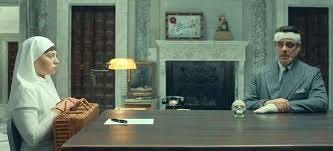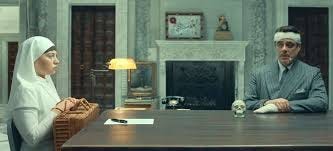Almost from the moment I first saw his debut feature Bottle Rocket during its brief 1996 theatrical release, I have been a fan of filmmaker Wes Anderson and when he is firing on all cylinders—as he was with Rushmore, The Royal Tenenbaums, Moonrise Kingdom, The Grand Budapest Hotel and others—his ability to tell stories that are visually arresting and dryly amusing while containing surprisingly powerful emotional underpinnings is without equal. That said, That said, even I have to admit that his recent output has not quite been up to the standards of his earlier projects—Isle of Dogs (2018) was a stop-motion whimsy that never quite come together in a satisfying manner, The French Dispatch (2021) felt like a clearing house for proposed stories that he could never quite make work as individual features and Asteroid City (2023) was a star-choked mess that at times felt like a vicious parody of his quirks assembled by one of his detractors and was further hobbled by a bizarre framing device that only served to underscore the hollowness of the material. Of course, those films had their moments of brilliance as well and I concede that an Anderson misfire is more interesting that the better works from a good chunk of the current DGA membership but overall, there was the sense that he was spending more time trying to shoehorn in parts for all the big movie stars who wanted to bolster their indie cred by associating with him (Asteroid City in particular jammed so many familiar faces into the mix that it almost made The Cannonball Run seem subtle in this regard) than in giving them material worthy of both them and himself.
Now Anderson has returned with his latest effort, The Phoenician Scheme, and while it may not ultimately be the complete return to form that one might have hoped to see, it comes closer to that mark than anything that he has done since The Grand Budapest Hotel. Although still suffering from a few increasingly familiar flaws—a cast too top-heavy for its own good and a story that could have been fleshed out further than it has been—it does have an idiosyncratic tone to it that I found myself enjoying more often than not, along with a number of big laughs and spectacular performances from the two central actors. More importantly, it is the first Anderson film in a long time to include a genuinely convincing emotional through-line that gradually accumulates a power that gives some real heft to what might have otherwise been just another bizarre trifle.
Set in 1956, the film revolves around one Zsa-Zsa Korda (Benicia del Toro), an old-fashioned oligarch whose behind-the-scenes maneuverings and oftentimes shady business dealings have made him one of the richest men in the world as well as one of the most hated. This becomes evident in the opening sequence in which the airplane in which he is riding suffers an attack and is forced to make a crash landing that he only barely survives. This might shake up most people but Zsa-Zsa is clearly not most people—he is so used to people trying to kill him (we learn that this is the sixth plane crash he has survived) that such attacks barely register with him. Instead, he is more consumed with his latest money-making endeavor—an enormously complicated plot to essentially control the economy of the fictional Middle Eastern nation of Phoenicia by undertaking a massive infrastructure project requiring slave labor and fiddling with the local agricultural market in ways designed to cause famine in the land.
Among those against Zsa-Zsa and his various plottings is the U.S. government and, as a way to stop him once and for all, they conspire with manufacturers to artificially drive up the price of seemingly innocuous but all-important rivets to such an extent that he stands to lose everything unless the myriad deals that he signed off on are renegotiated in the hopes of regaining his now-vanished profit margin. This requires him to journey around the world to meet with various oddballs in the hopes of striking those deals, including American businessmen Leland (Tom Hanks) and Reagan (Bryan Cranston), the mysterious Marty (Jeffrey) the powerful Prince Farouk (Riz Ahmed) and the sly Marseille Bob (Mathieu Amalric). There are even a couple of family members involved as well in Cousin Hilda (Scarlet Johansson) and his brother Nuba (Benedict Cumberbatch), who Zsa-Zsa suspects is responsible for the murder of the first of his three wives.
As it turns out, that last plane crash evidently has inspired Zsa-Zsa to be a little more contemplative about his future and his legacy. To this end, he passes over his gaggle of sons and implores his estranged only daughter, Liesl (Mia Threapleton), to take over his vast empire when he finally dies and to accompany him on his quest so that she can get a feel for the business that will one day be hers. This does not exactly thrill Liesl—she is just on the cusp of renouncing all worldly possessions and taking her final vows to become a nun and she is understandably appalled to learn about the portions of the plan involving slavery and famine. However, she does agree to accompany him, partly in the hopes of steering Zsa-Zsa into finding more humanitarian options for his plan and partly because she also suspects Nuba of murdering her mother and would like a shot at him as well. Another change in Zsa-Zsa is that now, when there is an attempt on his life (and they do continue), they inspire visions of a heavenly afterworld populated by the likes of Willem Dafoe, Charlotte Gainsbourg, F. Murray Abraham and, perhaps inevitably, Bill Murray as God.
Although this description may make The Phoenician Scheme seem as complicated as its titular business proposition (I see that I haven’t even mentioned the presence of Bjorn, a Swedish tutor portrayed by Michael Cera who ends up tagging along on the adventure and who is in love with Liesl), it isn’t that hard to follow around. The various business encounters are absurd enough but aren’t that important in the grand scheme of things—for all the huffing and puffing and weirdness surrounding the meetings (ranging from a quick game of basketball over a deal point to a fight between Zsa-Zsa and Nuba), they essentially come down to shifting a couple of numbers here and there. What is the real heart of the story is the evolving relationship between Zsa-Zsa and Liesl, which initially plays like a trans-continental version of the romps that Royal Tenenbaum indulged in with his grandsons in The Royal Tenenbaums, but which eventually moves into something deeper as he begins to discover something close to a more altruistic spirit under her influence while she begins to learn to understand both the father she has barely known and the world and legacy that she had been contemplating giving up for good.
Although an improvement on his recent ventures, The Phoenician Scheme is not exactly prime Anderson. The story is essentially a piss-take reshuffling of Orson Welles’s Mr. Arkadin (itself a bizarre remix of his own Citizen Kane) and while that aspect and the retro style may amuse some viewers, they are just as likely to leave others a little cold. The film does offer a number of big laughs along the way (the opening sequence, in which Anderson offers up his version of a big-time action beat in the form of an airplane attack/crash, is especially funny), of course, but there are also a number of long sequences that seem to essentially be treading narrative water while allowing yet another big star to make an appearance—I am still a tad unsure as to the function of Johansson’s character and while the sight of Anderson regular Murray as God is certainly an intriguing notion, the afterlife hallucinations don’t quite land. Throughout the film, you get the sense that Anderson and frequent screenplay collaborator Roman Coppola are trying to force things into the mix in order to get it up to a conventional feature length.
However, the real heart of the film, and the reason that it winds up succeeding, is the relationship between Zsa-Zsa and Liesl and how it is brought to life through the performances by Del Toro and Threapleton. Having previously appeared as one of the more effective elements in The French Dispatch, Del Toro moves up to central character status here and proves again to be an uncommonly effective avatar for Anderson’s deadpan take on the world—like Gene Hackman in The Royal Tenenbaums and Murray in Rushmore, he takes to the absurdities around him with great aplomb while at the same time demonstrating a sense of gravitas that allows Zsa-Zsa to seem, at least eventually, like a real person and not just a collection of odd tics and mannerisms. As for Threapleton, who has been in a few things over the years but who is presumably best known for being the daughter of Kate Winslet (and there are times in which she looks and sounds eerily like her mother), she delivers a smashing star-making turn as Liesl, demonstrating a fine ability to fit in with Anderson’s particular style of filmmaking and more than holding her own against the army of heavy hitters she is sharing the screen with, most notably in her scenes with Del Toro. Right from the start, the two demonstrate a fascinating performance dynamic that proves to be the beating heart behind the film’s immaculately designed surfaces and allows the real point of the proceedings—the attempt by a father to leave a legacy to his child that goes far beyond material wealth and possessions and which isn’t limited to what can be fit into a bunch of boxes and containers, no matter how elaborately appointed or intricately labeled as they might be—to shine through and hit with unexpected force and emotional power.
Needless to say, The Phoenician Scheme is probably not the film to use to introduce newcomers to the cinema of Wes Anderson and those who are already naysayers are unlikely to find their opinions changing in regards to his work. Even his biggest supporters are likely to find it a mid-level effort at best that never quite hits the heights of the likes of Rushmore, The Royal Tenenbaums or The Grand Budapest Hotel. Despite all of that, the film works more often than it doesn’t—it contains more solid laughs that his last couple of films and the scenes focusing on the relationship between Zsa-Zsa and Liesl are both very funny and eventually equally touching. If it is ultimately nothing more than another odd and idiosyncratic trifle from Anderson, at least it is a smoothly effective one that contains a central relationship that is just as striking and offbeat as the visual compositions.




